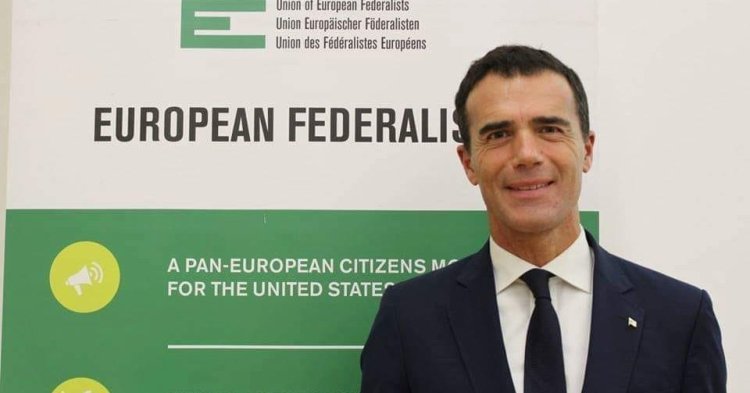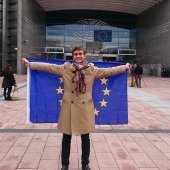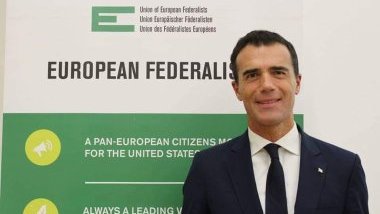Laura Mercier, Le Taurillon (LM): What are your priorities for your presidency of the Union of European Federalists?
Sandro Gozi (SG): The objective is obviously to place the choice of a sovereign Europe back at the centre of the debate. For me, a federal Europe means a sovereign Europe. It’s about placing at the heart of discussions and exchanges the democratic means to retake control of the big questions of our societies: migration, the fight against climate change, the fight against terrorism, defence and security, but also decisions for the common good on questions of global finance and digital affairs. A sovereign Europe means a democratic community within which we have to retake control of these subjects for the common good. That has to be at the heart of the action and the vision of the Union of European Federalists.
Moreover, there’s the fact that European debate has never been as present as it is at this moment, and that it may represent the main (but not only) cleavage in politics in Europe. Indeed, for the first time, these European elections present a clear divide between pro-Europeans and progressives on one side and reactionaries and neo-nationalists on the other. That was exactly the prophecy written by Altiero Spinelli in the Ventotene Manifesto of 1943. Today we find that cleavage for the first time. Even though it’s not the only divide, there’s still left-wing and right-wing values, for the first time the debate on the return to nationalism has established itself, and so we need to give good responses, especially to questions posed by nationalists.
In my view, a good part these answers are to be found in a sovereign and democratic Europe.
LM: In the short term, what institutional changes do you support? What do you think should be the priorities of the next European Parliament?
SG: You have to start with policies and then reform the institutions, not the other way round. European defence and a European army are fundamental for a Europe that improves protections and guarantees the security of citizens. A social Europe, and a Europe of big social investment plans and European social rights have to be at the heart of the next legislature in order for Europe to provide more opportunities.
Above all, there is a lot of work to do on the transnational dimension of democracy within the European Union. That’s the third big project: fostering and asserting a transnational political and civic space. Consequently, we have to encourage transnational networks of associations and civic movements, to open the minds of national political parties’ leaders for Europeanising their way of thinking, and then their way of acting. To this end, we need to again address questions like that of transnational lists for the 2024 elections. That’s a useful (but not the only) instrument for achieving the objective of transnational European politics.
Finally, we also need to realise the reform of the Eurozone to enable a relaunch of Europe with a dynamic group of countries and peoples that wants to advance.
LM: To return to the question of creating a resolutely transnational way of doing European politics, in your book “Generation Erasmus” you suggested concrete solutions which have yet to be implemented. Transnational lists were rejected by the European Parliament last February, and the European Council has stated that it would not necessarily nominate the Spitzenkandidat whose party wins the majority in European elections for Commission presidency. We also observe that some parties, like ALDE, haven’t nominated a Spitzenkandidat. What are your sentiments about the questioning of this informal practice a few months before the European elections?
SG: That’s a logical consequence of the EPP’s rejection of transnational lists. In order to be backed up by real democratic legitimacy and citizen mobilisation around the choice of the President of the European Commission (or in the future, European Union), Spitzenkandidaten must be linked to a direct democratic choice through transnational lists. Those who want to defend the Spitzenkandidaten system have to help us introduce transnational lists because that’s the only way to link up the democratic choice of citizens to the nomination of the Commission President. That’s also a necessary stage towards the creation of truly European political parties. It’s one part of the solution for affirming a real and not just formal democracy.
LM: Earlier you said that the current debate on European issues is very much characterised by the cleavage between Eurosceptics on the one hand and pro-Europeans on the other hand – a cleavage that leaves European citizens with the choice between nationalism and European reform. Do you think that it’s a healthy and fruitful debate for the European elections, or should we try to go beyond this binary?
SG: That’s not a debate that we’re creating, but a debate that we find in society. We, therefore, need to take on the debate, leave the status quo behind and move forward. The idea of a sovereign, progressive and federalist Europe is a way to move forward from this status quo. The federalists and the nationalists want to overhaul the current state of affairs, but the solutions are very different. These solutions need to be concrete and relate to the daily lives of citizens: the green transition, fight against inequalities and poverty, opportunities for young people, and investments between European partners.
That’s why we need to first advance public policies at the European level and then envisage new institutions. Because our Europe has to rest on the political will of a group of peoples, and because it’s time to make a real, qualitative leap in European policies.
LM: How do you view states led by Eurosceptic or even anti-European governments? In the long term, do you think that the EU can stay united if several levels of cooperation are sustained within it?
SG: Today in the European Union, fundamental values are threatened. We need to combat nationalism. The fact that member states of the EU are led by nationalists puts even more importance on the European elections and to the role that the European Parliament will have to play during the new legislature.
I think that we can’t build a sovereign Europe if all member states advance at the same pace and with the same modalities. We need to create a favourable democratic dynamic led by countries and peoples which still has to stay open to states that wish to join it. If we stay with the status quo, the EU will be at risk and we may witness the start of European disintegration.
This sense of urgency must push us to win the European elections with our federalist ideas and to influence the European Parliament as much as possible to adopt a federalist agenda. That’s the goal of the Union of European Federalists, and that’s one of the objectives that I’ve laid out upon my election as president of the organisation.
LM: How can European federalism bring people together in a common project, considering the different issues and difficulties that they are confronted with?
SG: A federal Europe is a Europe that allows us to retake control of subjects that worry us, together, in a democratic fashion. We’re all worried about the vagaries of global finance, the challenges related to the digital revolution, we’re worried about terrorism. Nation states and their national, even nationalist, policies divide us, separate us, and make us impotent. A sovereign Europe is the only way to retake control. We’re in a context of global disorder where continent-sized states like Russia, the USA and China have very different interests and values from ours. If we want to be global leaders, to promote our interests and defend our values in this global disorder, we need to act united or otherwise, we will disappear from the political map of the world.
LM: What would you like to say to the readers of the magazine?
SG: I’d like to tell them that it’s the moment to mobilise. It’s the moment to work together to create a critical mass that guides policies towards completing the European project. By crossing borders and traditional partisan cleavages, by overcoming the differences of the past. It’s the moment to work for a federal Europe.




Follow the comments: |
|
